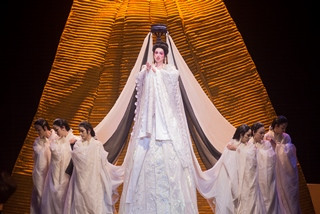|
Back
Opéra de Montréal’s Season Ends with a Hit Montreal
Salle Wilfrid-Pelletier, Place des Arts
05/17/2014 - & May 20, 22, 24, 2014
Giacomo Puccini: Turandot
Galina Shesterneva (Turandot), Kamen Chanev (Calaf), Hiromi Omura (Liù), Grigori Soloviov (Timur), Jonathan Beyer (Ping), Jean-Michel Richer (Pang), Aaron Sheppard (Pong), Guy Bélanger (Emperor Altoum), Josh Whelan (a Mandarin)
Chœur de l’Opéra de Montréal, Les Petits Chanteurs du Mont-Royal and Les Voix Boréales, Claude Webster (Chorus Master), Orchestre Métropolitain, Paul Nadler (Conductor)
Graeme Murphy (Director and Choreographer), Kim Walker (Assistant to the Director), Kristian Fredrikson (Set and Costume Designer), John Drummond Montgomery (Lighting Designer)

G. Shesterneva (© Yves Renaud)
Opéra de Montréal is wrapping up its 2013-14 season with a sold-out run of Puccini’s final opera Turandot. The dazzling production from Opera Australia had the house howling with appreciation at the end of opening night.
All singers projected exceptionally well to the rear of the parterre, a relative rarity in the immense 3000-seat Salle Wilfrid-Pelletier. The standout was Japanese soprano Hiromi Omura as Liù. Her high notes in Act One’s "Signore, ascolta" rang with crystal clarity, and her final aria in Act Three, "Tu che di gel sei cinta" had warmth and pathos aplenty to melt the most hardened heart. Close behind was Bulgarian Kamen Chanev as Calaf. His confident, ringing tenor was infused with beauty, power and resonance. He ruined "Nessum dorma," however, by holding back power, interpretation and attention to color and phrasing until the last two notes, with which he shamelessly milked the audience for applause.
Russian soprano Galina Shesterneva sang "In questa reggia" with the requisite icy coldness but her voice sounded dry, brittle, and sometimes punctuated with clipped notes. She improved, however, as she warmed up, and in the end was singing with conviction and ease. Russian Grigori Soloviov’s gravelly bass was perfect for the blind, enfeebled Timur.
American baritone Jonathan Beyer and Canadian tenors Jean-Michel Richer and Aaron Sheppard were all strong as Ping, Pang and Pong respectively. Canadian tenor Guy Bélanger was convincing as Emperor Altoum, and Canadian baritone Josh Whelan impressive for the beauty and rounded resonance he brought to the role of the Mandarin. Richer, Sheppard and Whelan are all members of Opéra de Montréal’s highly successful apprentice program—Atelier lyrique. The large chorus, prepared by Claude Webster, sang with precision, clarity and finesse. The only misstep was the uneven entry on the first appearance of the women’s chorus.
What truly made this production sizzle was the remarkable work of Australian stage director and choreographer Graeme Murphy. As artistic director of the Sydney Dance Company for over 31 years, he created more than 50 works, including 30 full-length productions. Using limited means and unlimited imagination, Murphy created an enchanting environment evoking China’s mythical past. The set was anchored by tall panels in the centre of the stage which revealed, depending on the scene, everything from an antique Chinese mask, the moon, a depiction of hell, the gong to signal Calaf’s participation in the riddle ritual, to the Emperor and Turandot. Their heads popping up from oversized costumes appeared miniscule in the middle of the proscenium space. Warriors in dark leather aprons, brilliantly-costumed supernumeraries and singers on stilts and rolling platforms, flowing banners of various colors and sizes, acrobats, dancers, rich and clever lighting (by John Drummond Montgomery), and innovative blocking and direction by the enormously talented Kristian Fredrikson were all a wonder to behold.
The Orchestre Métropolitain (of which Yannick Nézet-Séguin is the artistic director and principal conductor) provided tight and seamless support under the baton of Paul Nadler. Particularly captivating was the music for the softer, poignant sections of the opera, especially from the strings. This medium-sized orchestra, however, lacked the heft needed to inject more excitement into the opening and more grandiose moments of the production. The larger Orchestre symphonique de Montréal, often engaged by the company, would have been a more felicitous choice.
Earl Arthure Love
|